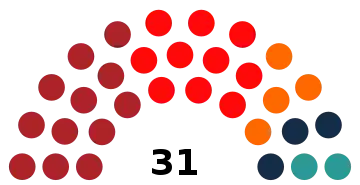| ||||||||||||||||||||||||||||||||||||||||
All 31 seats in the Inatsisartut 16 seats needed for a majority | ||||||||||||||||||||||||||||||||||||||||
| Turnout | 65.92% ( | |||||||||||||||||||||||||||||||||||||||
|---|---|---|---|---|---|---|---|---|---|---|---|---|---|---|---|---|---|---|---|---|---|---|---|---|---|---|---|---|---|---|---|---|---|---|---|---|---|---|---|---|
This lists parties that won seats. See the complete results below.
| ||||||||||||||||||||||||||||||||||||||||
Snap general elections were held in Greenland on 6 April 2021 alongside local elections.[1] Inuit Ataqatigiit emerged as the largest party, winning 12 of the 31 seats in the Inatsisartut. The governing Siumut party finished second with 10 seats.[2][3]
Background
In November 2020, Prime Minister Kim Kielsen was defeated in a leadership election for the Siumut party, losing to Erik Jensen. However, Kielsen did not step down as Prime Minister. Growing rivalry between the two and disagreement over the Kvanefjeld mine led to the Democrats pulling out of the coalition government, leaving Siumut and Nunatta Qitornai with only 12 of the 31 seats in the Inatsisartut.[4] Kielsen failed to form a new coalition government and the Inatsisartut voted to hold snap elections.[1][5]
Rare earth mining was expected to be a key issue in the elections, with the Kvanefjeld deposit in the south of the island being subject to public hearings and party campaigning.[6][7] The metals found in Greenland are used to manufacture components in, for example, wind turbines and electric vehicles. The process is polluting but the resources experienced an increase in price due to increasing demand for electric vehicles. Uranium is also found in Greenland, but the mining of the resource faced strong opposition from residents.[8] Greenland Minerals Limited, an Australian-based Chinese-owned company had been planning a project to mine in the area of Kvanefjeld since 2007 and was on its "final hurdle".[9][10]
The opposition party Inuit Ataqatigiit called for a moratorium on uranium mining, putting into question the wider rare earth mining project, whilst the ruling Siumut party voiced support for the project, citing economic growth as a key reason.[11][12][13] In a survey to determine the public opinion on mining in the Kvanefjeld deposit, 63% opposed such activity, of which 45% were very much against.[14] Other issues, such as independence, COVID-19 policies, foreign policy, and opinions on democratic institutions were considered less important than the debate over mining.[10]
Electoral system
The 31 members of the Inatsisartut are elected by proportional representation in a single nationwide constituency. Seats are allocated using the d'Hondt method.[15]
Opinion polls
Four polls have been conducted since 2019.[16][17][18] In a poll conducted shortly before the election, the Inuit Ataqatigiit received 36% of the votes with the Siumut in second with 23%.[19]
| Date | Siumut | IA | Democrats | Naleraq | Atassut | NQ | SA | Lead |
|---|---|---|---|---|---|---|---|---|
| April 2021 | 23.2% | 36.2% | 13.4% | 16.4% | 6.5% | 2.1% | 2.2% | 13.0% |
| 8 | 12 | 4 | 5 | 2 | 0 | 0 | 4 | |
| February 2021 | 29.4% | 38.4% | 11.3% | 12.2% | 6.8% | 1.2% | 0.7% | 9.0% |
| 9 | 13 | 3 | 4 | 2 | 0 | 0 | 4 | |
| December 2020 | 31.0% | 34.5% | 12.7% | 11.0% | 6.1% | 2.6% | 2.1% | 3.5% |
| 10 | 12 | 4 | 3 | 2 | 0 | 0 | 2 | |
| January 2019 | 28.7% | 30.6% | 21.7% | 10.3% | 4.5% | 2.2% | 2.5% | 1.9% |
| 10 | 10 | 7 | 3 | 1 | 0 | 0 | Tie | |
| 2018 general election | 27.4% | 25.8% | 19.7% | 13.6% | 6.0% | 4.1% | 3.5% | 1.6% |
| 9 | 8 | 6 | 4 | 2 | 1 | 1 | 1 |
Results
 | ||||||
|---|---|---|---|---|---|---|
| Party | Votes | % | +/– | Seats | +/– | |
| Inuit Ataqatigiit | 9,933 | 37.44 | +11.66 | 12 | +4 | |
| Siumut | 7,986 | 30.10 | +2.66 | 10 | +1 | |
| Naleraq | 3,252 | 12.26 | –1.29 | 4 | 0 | |
| Democrats | 2,454 | 9.25 | –10.44 | 3 | –3 | |
| Atassut | 1,878 | 7.08 | +1.12 | 2 | 0 | |
| Nunatta Qitornai | 639 | 2.41 | –1.04 | 0 | –1 | |
| Cooperation Party | 376 | 1.42 | –2.69 | 0 | –1 | |
| Independents | 10 | 0.04 | New | 0 | New | |
| Total | 26,528 | 100.00 | – | 31 | 0 | |
| Valid votes | 26,528 | 97.86 | ||||
| Invalid/blank votes | 581 | 2.14 | ||||
| Total votes | 27,109 | 100.00 | ||||
| Registered voters/turnout | 41,126 | 65.92 | –5.94 | |||
| Source: Qinersineq.gl | ||||||
By party, those elected were:[20]
- Inuit Ataqatigiit (12): Aqqaluaq B. Egede, Múte Bourup Egede, Stine Egede, Sofia Geisler, Eqaluk Høegh, Kristian Jeremiassen, Mimi Karlsen, Kalistat Lund, Asii Chemnitz Narup, Naaja Nathanielsen, Peter Olsen, Mariane Paviasen
- Siumut (10): Qarsoq Høegh-Dam, Aslak Vilhelm Jensen, Doris Jakobsen Jensen, Erik Jensen, Kim Kielsen, Mala Høy Kúko, Vivian Motzfeldt, Anders Simon Olsen, Lars Poulsen, Jess Svane
- Naleraq (4): Pele Broberg, Hans Enoksen, Jens Napãtôᴋ', Emanuel Nûko
- Democrats (3): Jens-Frederik Nielsen, Nivi Olsen, Anna Wangenheim
- Atassut (2): Siverth Heilmann, Aqqalu Clasen Jerimiassen
Aftermath and government formation
After the election results came in, Inuit Ataqatigiit leader Múte Bourup Egede thanked voters for their win while Siumut leader Erik Jensen said that his party would wait to see what IA would offer during the coalition negotiations.[21] Siumut Prime Minister and former leader Kim Kielsen received more personal votes than Jensen,[22] which led to a continuation of the party infighting between the two as Jensen affirmed his desire to continue as leader after the election and deputy leader Inga Dora Markussen partially blamed Kielsen for the loss.[23]
On 8 April Egede said that his party had begun negotiations with other parties the day before and that he expected a coalition to be formed after 15 April, at which point IA would have met with each party a few times.[24] After Egede expressed a desire for a government with at least 16 seats, the second round of negotiations began on 9 April;[25] later that day the Democrats ruled out forming a coalition with IA citing irreconcilable views and wishing Egede luck in forming a coalition.[26] On 13 April, Egede announced that negotiations with Siumut had also fallen through, blaming infighting within Siumut for their inability to come to an agreement.[27]
On 16 April, it was announced that IA had successfully negotiated a coalition agreement with fellow pro-independence party Naleraq which would hold a combined 16 seats in the legislature (a one seat majority). Atassut announced that they would be willing to support the coalition.[28]
References
- 1 2 Greenland's parliament calls an early election Arctic Today, 17 February 2021
- ↑ "Results - Parliament Election 2021". Greenland Government Authorities. Retrieved 7 April 2021.
- ↑ "Anti-mine party wins Greenland election". The West Australian. 7 April 2021.
- ↑ McGwin, Kevin (8 February 2021). "Greenland's premier loses majority ahead of new legislative session". Arctic Today. Retrieved 9 April 2021.
- ↑ Lehtinen, Julius (April 5, 2021). "Greenland Parliamentary Elections: Independence on the Horizon". Europe Elects. Retrieved April 6, 2021.
- ↑ "Greenland goes to the polls in rare earth mining election". Agence France-Press. 2021-04-06. Archived from the original on 2021-04-06. Retrieved 2021-04-06 – via the Guardian.
- ↑ Overgaard, Sidsel (6 April 2021). "Global Mining Industry Closely Monitors Greenland's Election". NPR. Archived from the original on 2021-04-06. Retrieved 2021-04-06.
- ↑ Gronholt-Pedersen, Jacob; Onstad, Eric (2021-03-02). "Mining magnets: Arctic island finds green power can be a curse". Reuters. Retrieved 2021-04-06.
- ↑ "Greenland's leftwing anti-mine party wins snap election". The Guardian. Associated Press. 7 April 2021. Retrieved 9 April 2021.
- 1 2 "Greenlanders head to polls in snap election". Arctic Today. 6 April 2021. Retrieved 9 April 2021.
- ↑ Breum, Martin (2021-02-25). "Greenland's snap election exposes global mineral demand". EUobserver. Archived from the original on 2021-02-25. Retrieved 2021-04-06.
- ↑ "Greenland election shows divide over rare-earth metals mine". Associated Press. 2021-04-06. Archived from the original on 2021-04-06. Retrieved 2021-04-06.
- ↑ Quinn, Colm (2021-04-06). "Greenland's Rare-Earth Election". Foreign Policy. Archived from the original on 2021-04-06. Retrieved 2021-04-06.
- ↑ Lindstrøm, Merete (5 April 2021). "Meningsmåling: 63 procent er mest imod Kuannersuit". Sermitsiaq (in Danish). Retrieved 9 April 2021.
- ↑ Election Profile IFES
- ↑ "IA stormer frem i ny meningsmåling". KNR (in Danish). Retrieved 2021-02-19.
- ↑ "Tegner til et sneskredsvalg" (in Danish). Retrieved 2021-04-03.
- ↑ @rasmusleander (April 2, 2021). "Den (s)eneste meningsmåling under valgkampen er netop publiceret af @sermitsiaqag #glpol #glvalg21…" (Tweet) – via Twitter.
- ↑ "Opinionsundersøgelse: Tegner til et sneskredsvalg". Sermitsiaq (in Danish). 2 April 2021. Retrieved 9 April 2021.
- ↑ "Seats and substitutes". qinersineq.gl. Retrieved 9 December 2021.
- ↑ "IA blev den store vinder". Sermitsiaq (in Danish). Retrieved 2021-04-13.
- ↑ "Kielsen vandt duellen, men hvad så". Sermitsiaq (in Danish). Retrieved 2021-04-13.
- ↑ "Inga Dora: Vil Kim være med eller ej?". Sermitsiaq (in Danish). Retrieved 2021-04-13.
- ↑ "IA-formand spår grønlandsk regeringsaftale efter 15. april". Sermitsiaq (in Danish). Retrieved 2021-04-13.
- ↑ "Forhandlingerne bliver mere konkrete". Sermitsiaq (in Danish). Retrieved 2021-04-13.
- ↑ "Demokraatit er ude af forhandlingerne". Sermitsiaq (in Danish). Retrieved 2021-04-13.
- ↑ "Siumut ude af koalitions-forhandlingerne". Sermitsiaq (in Danish). Retrieved 2021-04-13.
- ↑ "Greenland's left-wing IA party forms new government, vows to block rare-earth mine". Reuters. 2021-04-16. Retrieved 2021-04-18.

.jpg.webp)
